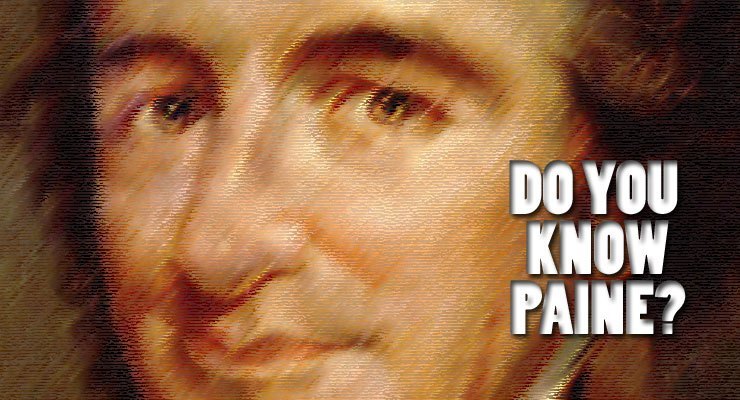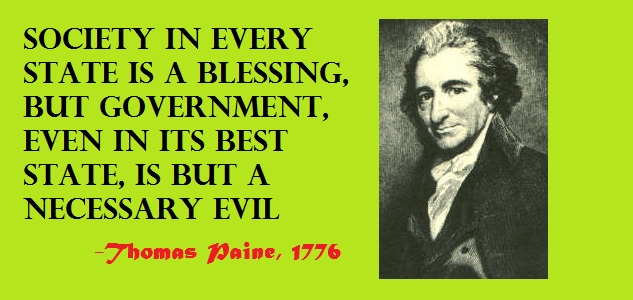
–
“We have it in our power to begin the world over again.“
– Thomas Paine
Democracy, elections and voting at Democracy Chronicles
Paine Day needs to be a national holiday to celebrate the international impact of the founding father. Paine was born in England February 9, 1737. His birthday should be widely celebrated as a day to recognize the international origins and impact of the American Revolution.
Born in the United Kingdom, Paine was a revolutionary advocate of democracy in the American and French Revolutions. He fought with George Washington against the British in New York City, supported freedom for all African slaves and diplomacy with Native American tribes. Later on, after barely escaping execution by guillotine during the Reign of Terror in France, he was outcast by George Washington, Thomas Jefferson, and his American allies after he criticized organized religion to the point where at his funeral in New York City, only five people were present: “In a carriage, a woman and her son who had lived on the bounty of the dead – on horseback, a Quaker, the humanity of whose heart dominated the creed of his head – and, following on foot, two negroes filled with gratitude – constituted the funeral cortege of Thomas Paine.”
At one time John Adams said, “without the pen of Thomas Paine, the sword of Washington would have been raised in vain”. Also see our articles on the Founding Fathers.
Choose a Work to Read for Thomas Paine’s Birthday!
- Common Sense (1776)
- The American Crisis (1776-77)
- The Rights of Man (1791-92)
- Age of Reason (1794, 1795, 1807)
The following is an address presented to Florida Veterans for Common Sense on the National Mall on Saturday, January 28, in celebration of the birthday of Thomas Payne. Harvey J. Kaye is the Ben & Joyce Rosenberg Professor of Democracy and Justice Studies at the University of Wisconsin-Green Bay and the author of ‘Thomas Paine and the Promise of America’:
It’s great to be back with you to celebrate Thomas Paine’s birthday – this year his 275th birthday. This is our seventh annual event and it may well be the best attended in the country.
In a radio interview yesterday, the host of the show, Rick Smith, asked me why Republican politicians avoid talking about Thomas Paine when Paine is so popular these days, even among Tea Partiers. I told him that the right and conservative rich – the powerful, the propertied, and the pious – have always feared Thomas Paine’s memory and legacy.
They didn’t like his pamphlet,Common Sense, which in 1776 turned America’s colonial rebellion into a revolution for independence and democracy.
They didn’t like his Crisis Papers with their words – such as “These are the times that try men’s souls” – which sustained Washington’s army in the darkest of times.
They didn’t like his Rights of Man, his great defense of the French Revolution, in which he attacked monarchy and aristocracy and laid out a vision of a social security system – the book that inspired British workers to struggle for democracy against the powers that be of the Industrial Revolution.
They didn’t like hisAge of Reason, in which he not only challenged the veracity of scripture and the power of churches and clerics, but also offered a spirited argument for separation of church and state.
And they didn’t like his Agrarian Justice, in which he advanced a pioneering plan for combating the ills and evils of poverty with strong doses of social democracy.
Moreover – and most of all – they hated the fact that Paine turned Americans into radicals and that we have remained radicals at heart ever since.
It may seem hard to see it all after thirty years of conservative political ascendancy and concerted class war from above. But if we open our eyes we can make out Paine’s legacy quite clearly.
You all know Washington DC, right? You all know the monuments, right? Let’s take a walk together. Not in the Capitol building. Not through the rooms of the White House or the Chambers of the Supreme Court. But on the National Mall. You will not find a statue to Paine there. But you will find his radical-democratic legacy recounted there.
Let’s see how we Americans really declare who we are and what we are about.
Let’s start at the Washington Monument, a giant obelisk reaching skyward in honor of a revolutionary general, the first President of a revolutionary nation.
Let’s go over to the Jefferson Memorial – a monument to a revolutionary writer, the author of the Declaration of Independence, the composer of the words “All Men are Created Equal” and “Life, Liberty and the Pursuit of Happiness.”
Let’s head back to the Lincoln Memorial – a monument to the Great Emancipator, the man who at Gettysburg spoke of a “new birth of freedom” and “government of the people, by the people, for the people.”
Let’s go next to the FDR Memorial – a monument to the President who mobilized a generation to fight depression and war, and to carry on that fight by making the United States freer, more equal and more democratic than ever before; a monument to the President who called on his fellow citizens to pursue the labors of relief, recovery, reconstruction and reform known as the New Deal; a monument to the man who articulated, and endowed us with, the vision and promise of the Four Freedoms: Freedom of Speech and Worship, Freedom from Want and Fear.
And finally, let’s make our way to the newest of the monuments – the memorial to Martin Luther King, Jr., the civil rights leader who led a struggle that entailed nothing less than a second American Revolution.
Washington, Jefferson, Lincoln, FDR, and King. All read and were inspired by Paine. And today, we celebrate our radicalism. But we don’t appreciate it.
So we have lots to make up for…
Our corporations may screw us. Our politicians may fail us. And our fellow citizens may disappoint us. But our task is not to scorn them.
Our task is to remind them of who we are. To remind them that we are Americans. To remind them that we are the children and grandchildren of revolutionaries, radicals, and progressives. To remind them, as Thomas Paine reminded us, that “We have it in our power to begin the world over again.”

Leave a Reply